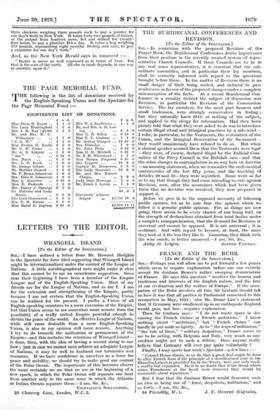THE RURIDECANAL CONFERENCES AND REVISION.
[To the Editor of the SPECTATOR.] SIR,—In connexion with the proposed Revision of the Prayer Book, the Ruridecanal Conferences derive importance from their position in the recently created system of repre- sentative Church Councils. If these Councils are to be in any real sense representative, it is essential that the sub- ordinate assemblies, and in particular their lay members, shall be correctly informed with regard to the questions brought before them. In the matter of Revision there is no
small danger of their being misled, and induced to pass resolutions in favour of the proposed changes under a complete
misconception of the facts. At a recent Ruridecanal Con- ference in a country district the subject of discussion was Revision, in particular the Revision of the Communion Service. The lay members, for the most part farmers and small tradesmen, were strongly conservative in feeling ; but they naturally knew little or nothing of the subject, and applied to the clergy for information. Had they been plainly told that what they were asked to do was to introduce certain illegal ritual and liturgical practices by a side-wind- I refer, in particular, to the Vestments, the restoration of the
Canon, and the liturgical Reservation of the Sacrament—
they would unanimously have refused to do so. But when a clerical speaker assured them that the Vestments were legal they were, of course, declared illegal by the Judicial Com- mittee of the Privy Council in the Ridsdale case—and that the other changes in contemplation in no way bore on doctrine an amazing statement, when we remember the ecclesiastical controversies of the last fifty years, and the teaching of Articles 28 and 31—they were mystified. Some went so far as to say that though they had come intending to vote against Revision, now, after the assurances which had been given them that no doctrine was involved, they were prepared to support it.
Before we give in to the supposed necessity of following public opinion, let us be sure that the opinion which we follow is a genuine public opinion. For, as things are now going, there seems to be every chance of our being told, on the strength of declarations obtained from local bodies under a complete misapprehension, that the demand for Revision is universal and cannot be opposed. It is not universal ; it is sectional. And with regard to laymen, at least, the more they look at it the less they like it. Camarina, they think with the wise oracle, is better umnoved.—I am, Sir, &c.,










































 Previous page
Previous page